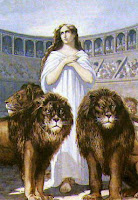 Like any historian, Eusebius is only as good as his sources. When it comes to 2nd century persecutions, his sources are sometimes excellent (e.g., Justin Martyr) and sometimes not quite as reliable. Nevertheless, while one might question some of the details he includes, Eusebius is an excellent source for understanding the reasons Christians were persecuted and the reasons Christianity was able to grow despite the persecutions.
Like any historian, Eusebius is only as good as his sources. When it comes to 2nd century persecutions, his sources are sometimes excellent (e.g., Justin Martyr) and sometimes not quite as reliable. Nevertheless, while one might question some of the details he includes, Eusebius is an excellent source for understanding the reasons Christians were persecuted and the reasons Christianity was able to grow despite the persecutions.
Read through some of the martyrdom sections in Books IV and V of Eusebius' History of the Church. Sections you might find particularly useful are 4:14-17 (which includes an account of the martyrdom of Polycarp) and 5:1-3 (which includes the martyrdom of Blandina).
What do you find in these sections that helps explain Roman persecution of the Christians or helps explain the perseverance of the Christians despite the persecutions?

I found both the martyrdom of Polycarp and Blandina very helpful in explaining why the Romans were killing Christians. First off the Christians were not the same religion as most Romans so they did not like that. Second the aggression they sowed against the Christians shows that they are taught by people higher up to hate Christians. An example Nazis told the Germans to hate Jews. I like how Polycarp and Blandina did not fear their death. It shows their strength in their religion.
ReplyDeleteWhen Polycarp was being burned alive, what did he do? He prayed. How much faith and hope does that take? That had to be an amazing spectacle for everyone who was there. For other Christians to see what Polycarp went through would have been a wonderful encouragement, that they can suffer persecution as well.
ReplyDeleteEusebius says that "the faithful emerged with a joyful smile, glory, and grace, wearing their chains as ornaments and perfumed with the sweet aroma of Christ". How good of a witness is that? If you can uphold that kind of an attitude, while being beaten and murdered and imprisoned.... that is a huge testament to the religion you believe in.
I hope that if I were ever persecuted the way Polycarp was, that I would respond the same way. He was given all sorts of outs, could have fled or could have denounced God and Christianity. If he had done this his life may have been spared.
ReplyDeleteHe chose to greet his persecutors with hospitality. He had a meal served and spoke the word of God while they ate. When he was brought in front of the people he was filled with God's peace and spoke words of encouragement. Just like India said, this is a huge testament to his religion, Christianity.
I hope that if I were ever persecuted the way Polycarp was, that I would respond the same way. He was given all sorts of outs, could have fled or could have denounced God and Christianity. If he had done this his life may have been spared.
ReplyDeleteHe chose to greet his persecutors with hospitality. He had a meal served and spoke the word of God while they ate. When he was brought in front of the people he was filled with God's peace and spoke words of encouragement. Just like India said, this is a huge testament to his religion, Christianity.
Polycarp's persecution was particularly interesting to me. Here's an old man arrested and put on trial, yet he takes advantage of every chance he has to proclaim the Gospel, and goes out with dignity. This is the best and humblest form of martyrdom.
ReplyDelete^ Above comment by Kent Johnsen
ReplyDelete